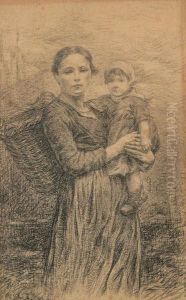Oscar De Beul Paintings
Oscar De Beul was a Belgian artist born on February 20, 1890, in Dendermonde, Belgium. Although not as widely recognized as some of his contemporaries, De Beul made significant contributions to the art scene during his time. He was a painter, draftsman, and printmaker, known for his landscapes, still lifes, and scenes of rural life. His style often reflected the influence of impressionism, with a focus on light and color.
During his lifetime, De Beul was part of a vibrant community of artists and was involved in several artistic circles. He received his formal education at the Academy of Fine Arts in Dendermonde and later at the Royal Academy of Fine Arts in Antwerp. His early works were marked by a keen observation of nature and rural settings, often depicting the countryside of his native Belgium.
As he progressed in his career, De Beul's work began to exhibit a greater sense of expressionism. His palette became more vivid, and his brushwork more dynamic, reflecting the broader shifts within European art during the early 20th century. Despite these stylistic evolutions, De Beul remained true to his roots, often returning to the themes of nature and the simple life of the countryside.
Throughout the 1920s and 1930s, De Beul’s work garnered attention, and he participated in several exhibitions. However, like many artists of his time, his career was inevitably impacted by the outbreak of World War II. The war years were difficult for De Beul, as they were for the entire European artistic community, and his output was limited during this period.
Oscar De Beul's life came to an end on October 30, 1948, in Antwerp. His legacy is preserved through his artworks, which continue to be appreciated by art historians and collectors. While he may not have achieved the same level of fame as some of his peers, his contributions to Belgian art remain significant, and his paintings continue to offer a window into the rural life and landscapes that inspired him throughout his career.
